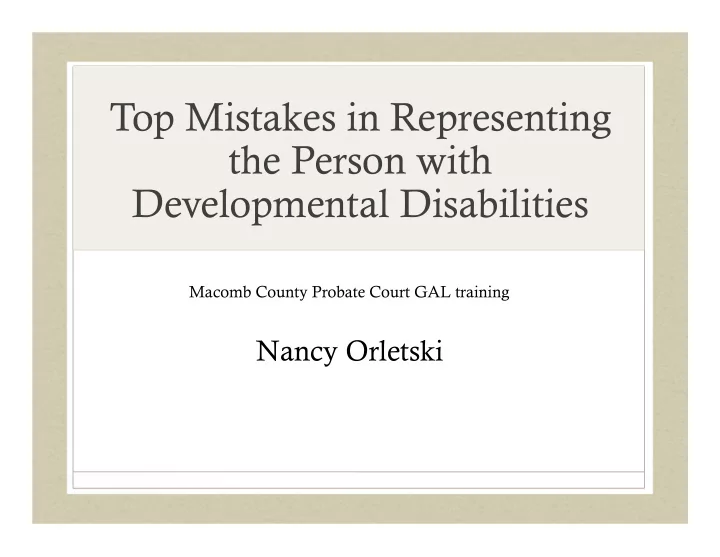

Top Mistakes in Representing the Person with Developmental Disabilities Macomb County Probate Court GAL training Nancy Orletski
Top Mistakes • Your own bias and preconceptions • Ineffective communication • Lack of client preparation • Not staying on top of special needs planning tools
The Role of Unconscious Bias We tend to accept information that confirms our prior beliefs and ignore or discredit information that does not. This confirmation bias settles over our eyes like distorting spectacles for everything we look at. Kyle Hill
The –isms Cultural bias • Racism • People with mental illness or autism are “lazy” • Ageism • People on government benefits have all they • need-well provided for Ableism • Why should I have to pay taxes to support • people with disabilities when they have money People with disabilities are a drain on society, • eugenics Parents are receiving secondary gain •
Families Have Unrealistic Expectations Resentment from Advocating uphill Presumption that client, referral against bias toward professional is source, court, or persons with obstructionist government disabilities Perception of being Lack of financial Not understanding taken advantage of and educational the legal process by professionals sophistication
Effective Communication
Is This Your Face?
Too Much Information
Communicating with Persons with Disabilities and Their Families • Using people first language • Getting to know the vernacular • Understanding the acronyms-AAA, CLS, DHS, POMS, BEMS 12
Using Inoffensive Language Do Not Use Instead Use • Confined to wheelchair Uses a wheelchair for mobility • • Retarded • Mental handicap Developmentally disabled • • Avoid words such as Intellectual disability “stricken with” ”suffers • from” “victim of” Presumes person is suffering • • Vegetable Person in vegetative state The difference between the • right word and the almost right A checklist of respectful phrases word is the difference between is included in your materials lightning and lightning bug -Mark Twain 13
Preparing the Client and Family for Court
Preparing the Client • Get to know the client They are more than their disability or the reason that • brought them to court • Tell them what to expect in the courtroom They may think they did something bad • Prepare them for doctor testimony • Let them tell the Judge what they CAN do •
Special Needs Planning Tools
ABLE Account Section 529a of the IRC-assets grow tax free • Must have acquired disability before age 26 • MiABLE is at www.miable.com • Only allowed ONE account • DHHS gets reimbursed upon death • National website to compare/contrast all ABLE accounts • Must be used for QDE’s: qualified disability expenses • Exempt resource for SSI and Medicaid • Can contribute up to $15,000 annually • Person can contribute up to $12,060 annually of gross wages • \www.ablenrc.org •
Special Needs Trusts • Who’s money is it? • Beneficiary’s money: First-Party SNT d4A-custom trust • d4C-pooled special needs trust-Springhillpooledtrust.org • • Anyone else’s money (including crowd funding): Third-Party SNT custom stand-alone preferred • Pooled third-party SNT- • www.springhillpooledtrust.org
Working with Special Needs Clients and their Families Be prepared to be inspired, oftentimes families dealing with more in a single • morning then we do all day Clients are typically happy that you are helping solve some of the most difficult • issues they will have Try to empathize with the client or their family • Understand that oftentimes, clients and their families will not have facts • available so it may take investigation Systems built for persons with disabilities are typically not well funded and • government workers are overworked, underpaid, and underappreciated
Recommend
More recommend